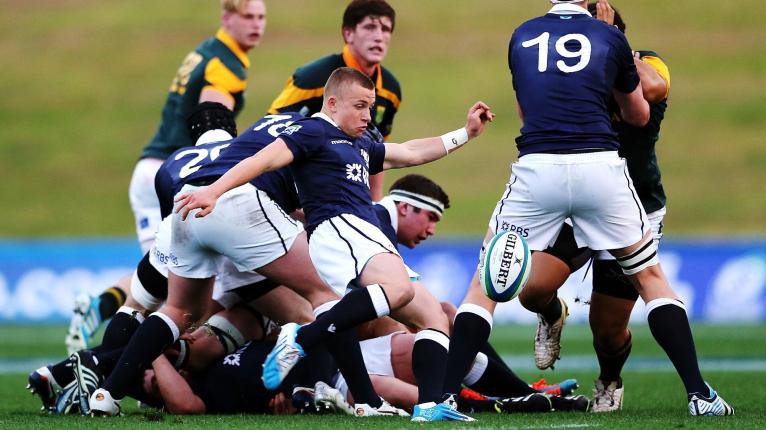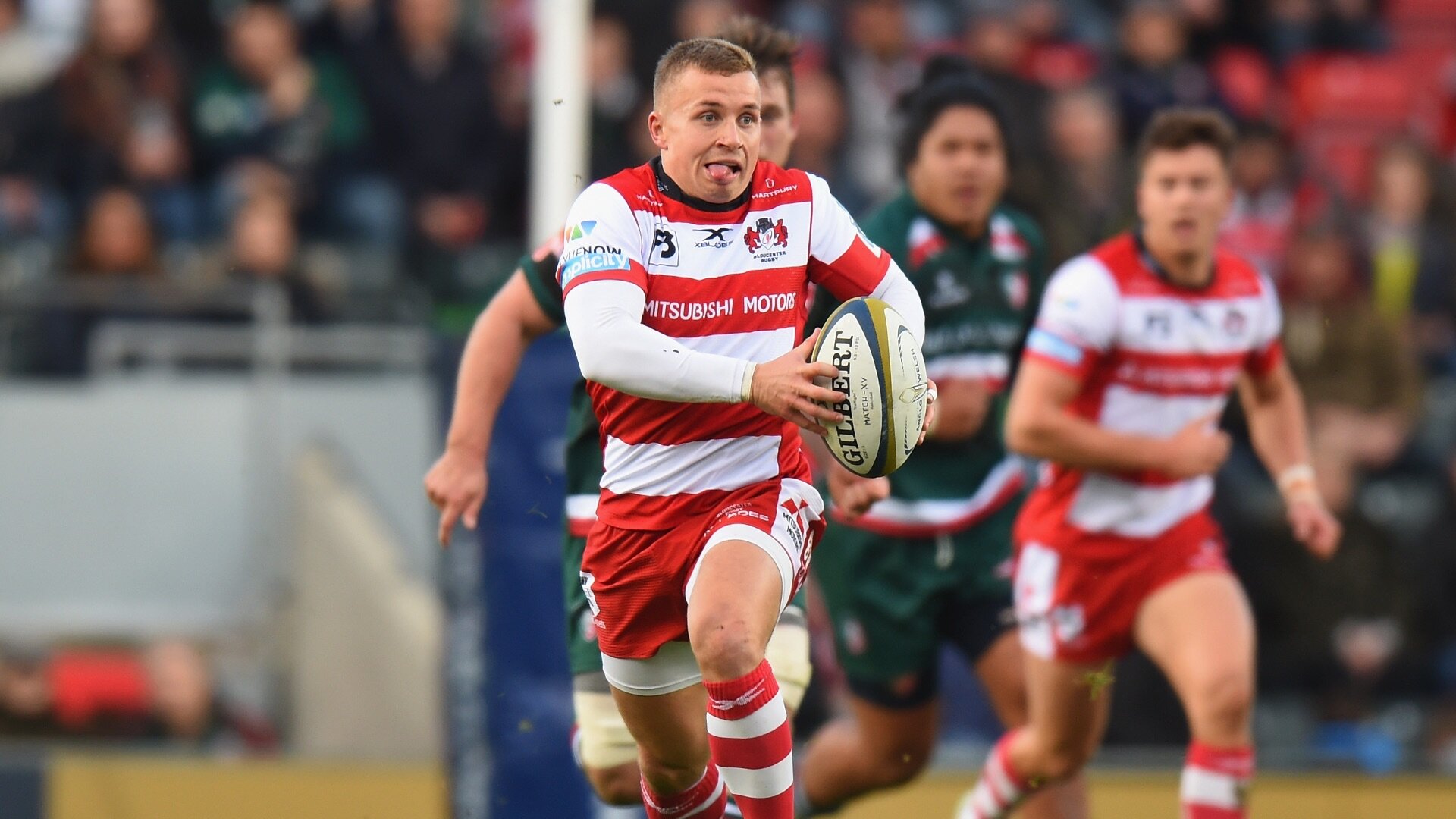Why Ben Vellacott put his England Qualified Player status ahead of representing Scotland

Ben Vellacott always knew there might come a time when the phone would ring and a career-defining decision over his international allegiance would loom.
The electric little scrum-half’s back story is well-documented. England-born and raised, a Scotland age-grade international at Under-17, Under-18 and Under-20 level thanks to his mother from Peterhead.
His talents have always been abundant – searing speed, mesmeric footwork, a lithe buzz-bomb half-back who can wriggle through the smallest of gaps and hurt you from anywhere.
A little over 18 months ago, he was dazzling for Gloucester, his form good enough to earn an approach from Gregor Townsend and the opportunity to join Scotland’s Six Nations squad.
The problem was that being capped would nullify his status as an English Qualified Player – a distinction that could torpedo his upward trajectory.
(Continue reading below…)
Premiership clubs are incentivised by the RFU to field more English-qualified players. Should a player lose or sacrifice his EQP status, unless he is a superstar in the making or set to become a regular international, he becomes a lot less attractive.
“It is difficult, especially with some international teams nowadays that will call up young players, play them in a game, then they literally won’t get played again,” Vellacott told RugbyPass.
“That’s something you’ve really got to think about. I’ve seen it before. Then when those players try to come back to England, clubs aren’t interested because they haven’t got the EQP status.
Loved this journey ? pic.twitter.com/xaA4bYYhyD
— B V ?? (@BenjiVellacott9) May 27, 2019
“If you’re good enough to play international rugby consistently, then great. But if you only play one or two games, then it can be a real risk.”
It sounds cynical, but players in Vellacott’s situation must often be shrewd about international opportunities. He feels an attachment to his homeland and the country of his mother.
Had there been the option to move to one of Scotland’s pro-teams, Edinburgh or Glasgow Warriors, things might have been different. Thinking of his club career and his future in the Premiership, he felt compelled to turn down the call.
All the while, there were rumblings that Vellacott might instead be involved in England’s Six Nations campaign. His representatives at the time were quietly confident that would come to pass – even Townsend stated as much in a pre-tournament press conference.
He was listed in Eddie Jones’ wider elite player squad, although he was never actually called in to train or play. With Scottish Rugby very publicly intensifying its search for eligible talent beyond Scotland’s borders, the suspicion was that Jones was mischievously marking their card.
“I came to the decision that with only just breaking onto the scene in the Premiership and still being under contract for a couple of years in England, that if I played for Scotland, I would lose my EQP status,” said Vellacott.
https://www.instagram.com/p/BxF0iLcAvA-/?utm_source=ig_twitter_share&igshid=1hny3l48nclps
“Without a club from Scotland approaching me regarding a contract, it was quite a risky move, as much as I want to play international rugby. Your EQP is very valuable in terms of securing your future.
“It was a very, very tough decision and something I had to sit down with my partner and family, it wasn’t an overnight decision. When I rang back and spoke to Gregor, he was obviously disappointed. It was very tough to make that decision.”
If, 18 months on, Vellacott had to choose, would he plump for thistle or rose? “It’s very up in the air. At the end of the day, I still need to focus on playing in the Premiership week in, week out, and if those international callings come that’s a decision I’ll have to make. It’s not really something I’m thinking about at the moment.”

A teasing question evaded as easily as a lumbering second row, but there is truth in the understandably non-committal response. At 24 years of age, what Vellacott really needs is time in the saddle. He made only 13 appearances for Gloucester in the Premiership and Champions Cup last season, 10 of which came from the bench.
The game plan, he says, was changing, and not in his favour. Too often he was seen as the spark to ignite a dwindling fire, rather than the man to get the blaze going from the start and keep it stoked. It was time to leave.
Wasps had long been tracking his progress, so with his Gloucester contract expiring, he took the option to move to Coventry, where he hopes opportunities will be more plentiful and the rugby more suited to his effervescent style. “I was always branded at Gloucester as an impact player, great off the bench,” he explained.
I would just like to say a massive thank you to everyone at @gloucesterrugby for their support over the last few years. A club that gave me the opportunity to play professional rugby when no one else would! It has been a privilege to play in the ?&?? shirt! pic.twitter.com/FfQ7WdGKqZ
— B V ?? (@BenjiVellacott9) February 7, 2019
“I want to be more than that; I don’t want to just be the player that plays 20 minutes or so here and there to make an impact. I want to be doing that from the start and that’s something I’ve got to learn within my game.
“And at Wasps, they’ve already given me that opportunity in terms of developing, whereas I felt at Gloucester I was still getting the same old reason why I wasn’t going to push to start.
“I’ve got no bad words to say about Gloucester but in terms of my career, I needed to go to a team where they revolve a lot of their game plan around the scrum-half. Gloucester were going away from that.
https://www.instagram.com/p/BdNtsnSB8OL/
“They play a great brand of rugby, they’re a team on the rise, but I need to think about my career and I didn’t want to stay in the same place that I had been for the last couple of years.
“[Gloucester scrum-halves] Willi Heinz and Callum Braley have got very good basic skills and work perfectly for who they have got outside them – Danny Cipriani. Why wouldn’t you revolve your game plan around him? He’s done absolute wonders for Gloucester. I had to put myself first, be a little bit selfish, and I wanted to go and push on.
“I played two years in the Premiership now and my first year was a pretty good season but coming into last year, I was just getting the same old reasons why I wasn’t going to get any more minutes.”
Wasps sign hot prospect Ben Vellacott from Gloucester Rugby https://t.co/pK4vv7RGlv pic.twitter.com/3lGbat5B3X
— WaspsRugbyNews (@waspsrugby_news) February 6, 2019
If last season was underwhelming for Vellacott, it was a damp squib for Wasps, eighth in the Premiership and bottom of their Champions Cup pool. “As a squad from last year, Wasps are very disappointed in how things turned out,” he said.
“Wasps have always been an attractive team to me because of the way they play their rugby. They love to chuck the ball around and if you look at past scrum-halves that have come through their system, they’re always looking for a livewire scrum-half. It was the right time to make the move and Wasps showed a great interest, so it was a pretty easy decision.
“You look at Glasgow Warriors with Ali Price and George Horne, they are both like-for-like players, and if Ali is away or injured, then George literally slots in. Glasgow have moulded their game around the two nines and I believe that’s what Wasps are going to try and do, and the reason I thought Wasps would be the perfect club for me.
“With Dan Robson at Wasps, it’s going to be a very tough task to get more minutes, but I believe between us, we can really push Wasps forward this year.”
WATCH: The latest RugbyPass documentary, Foden – Stateside, looks at how ex-England international Ben Foden is settling into Major League Rugby in New York




























